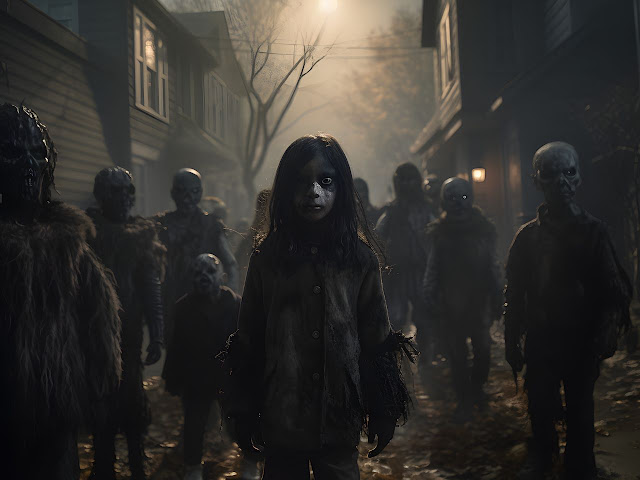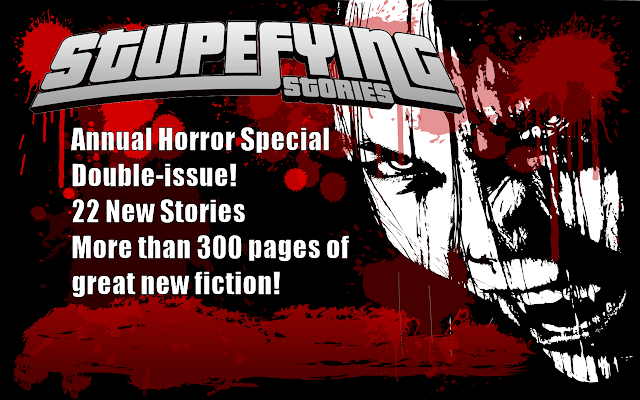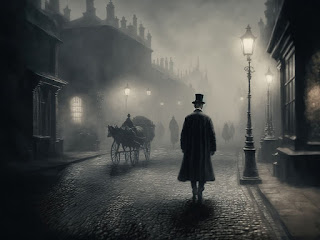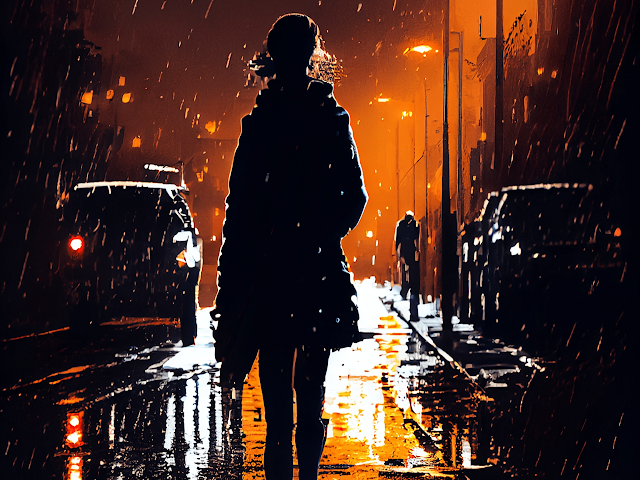My husband picks you when he learns your name. As you speak intimately of Rembrandt and Van Gogh, tossing your mane of copper hair, he thinks it no coincidence that we are both named Maria.
My husband is a fool.
You show samples of your work, saying art restoration is like archaeology, seeking clues to how the work once looked. He says my portrait cannot leave his country estate, being too delicate for transport (utter nonsense—he wants you there), and it is all he has left of me since my untimely death. He shows you a photograph.
You see my face, dark hair, dark eyes, olive skin. You think I look angry.
I am. But not at you.
You ask about the women in the background—the short-haired blonde reading by a tree, the raven-hair wearing a maroon scarf strolling by the lakeshore, seven in all. To your eye, they clutter the background—were they added by subsequent artists?
Jonathan says they are part of the original painting, and must be treated accordingly.
§
The taxi takes you past fields and forests to the Trevanion estate. Jonathan only occupies it in summer, and when he leaves, so do the staff.
You don’t go inside just yet. The lake to your right looks inviting.
Its shore is rocky. Though the water looks deep, you know diving is not a good idea. You have a swimsuit in your luggage. You change, walk carefully to the edge, and lower yourself in.
The water is amazingly clear. You go down to gauge its depth, and encounter large, jagged rocks. Numerous fish flash silver in the tinted sunlight, and you playfully tickle a few.
When you come ashore, you sense someone waiting for you. But when you look up, no one is there.
You change again, and let yourself into the manor.
The furniture is covered with sheets, like cartoon ghosts poised to startle the unwary. Artwork adorns every wall. And in a top-floor room, with a wide, south-facing window, resting on an easel, is the portrait.
A photograph is nothing compared to reality. You sense my anger more keenly, though I only show it through my eyes.
It is too late in the day to start work now. You go to the kitchen, make a light supper, and go to bed early.
Your dreams are troubled. You run through the manor, hearing anxious whispers to flee at once—but you never find the exit.
§
At dawn, you eat eggs and toast, and take your toolbox to the top-floor room.
Jonathan was not wrong about those background women. Your magnifying glass and ultraviolet flashlight show that clearly. But you still think their presence makes the painting feel crowded. And these women—the book-reading blonde, the scarf-wearing raven-hair, a blonde on the balcony, a brunette on the rooftop(!) in tight jeans and a turtleneck—don’t look like mere models but real people.
But your task is straightforward. You open your toolbox, draw out your solvents, pigments and brushes, and begin.
§
In the end, it is flawless. You tell Jonathan so on the phone: the scratch beneath my left eye is gone, the years of dust are sponged away, and the women’s faces show much more clearly. The work only awaits Jonathan’s approval.
“Good,” he says. “I will be there in three days at the most.”
You hang up, thinking you have time to celebrate.
We would warn you if we could.
§
You plan on ordering a gourmet pizza. Before that, however, you decide on a dip in the lake.
You don your swimsuit, walk gingerly among the rocks, and ease yourself in. It’s cooler than when you first came here, but nothing you can’t handle. The lake is clear as ever, and the fish are much more sluggish, making it easier to tickle them.
When you climb ashore, you look up in time to see Jonathan holding a rock.
He was planning to murder you all along. He thinks I want more company in my painting.
It began with Maria Bailey, the raven-hair by the lake, because she looked very much like me. Months after my death, Jonathan saw her, learned her name was Maria. They became lovers. Then he showed her my portrait, and she realized he was not loving her, but loving me through her. They argued, fought, she slipped, knocked her head against a hearthstone, and died.
I accepted her into my portrait because I pitied her. Yet doing so started a vicious cycle. For Jonathan saw her in my portrait, saw my look of pity for her, and mistook it for gratitude for providing me with company. And when that look of pity faded and became anger toward him, he thought I wanted more company. Thus, Maria Kivi reading by the tree, Maria Relph watching clouds from the balcony, Maria Fuller wearing her turtleneck and tight jeans, Maria Kacey, Maria Olsen, Maria Reddy.
All named Maria. That’s why he chose you.
Jonathan raises the rock. But you are no shrinking violet. You fight back.
The contest is too evenly matched for our liking. We exert our wills to try to affect the outcome.
We don’t quite get the result we want. Jonathan slips and falls to his death… but so do you.
§
You break the surface, wondering by what miracle you survived. You see us waiting on the shore.
“Take my hand,” I say.
The other Marias welcome you with open arms. “It’s all right,” says Maria Bailey, draping a towel around your shoulders. “You’re among friends now.”
The others turn back to the lake, knives in their hands. When Jonathan surfaces, I take his hand, and the others stab him dead.
You’re in the painting now, in case you haven’t guessed. You will begin each day rising from the lake. And each day we will kill Jonathan as he steps ashore.
We are happy in this afterlife he has sent us to.
But that doesn’t mean he gets to enjoy it.
__________________________
JASON D. WITTMAN lives and works in Minnesota. He has had published fiction in Scifi.com and Baen’s Universe, as well as three previous stories, “Emissaries from Venus,” “The She-Dragon of Bly,” and “Once Upon a Horror,” in Stupefying Stories. He has also had two games published by Steve Jackson Games, and can recite Edgar Allan Poe’s “The Raven” from memory.
________________________
In a world...
Where
the Soviet Union won WWII, England is now a Soviet satellite, some
magic actually works (sometimes), and Premier Kruschev is going
eyeball-to-eyeball with President Patton—The
last surviving member of His Majesty’s Dragonslayer Corps is called out
of retirement, because it seems dragons aren’t extinct after all, and
one has taken up residence in a prominent Politburo member’s country
estate. Read the rest in THE SHE-DRAGON OF BLY, by Jason D. Wittman, just one of the terrific tales in STUPEFYING STORIES 22!
Available in paperback only, for reasons too arcane to explain.
Have a Kindle? Find out what you’ve been missing!
Buy the four latest issues with just one click!
(Or buy just one, if that’s what you’d really prefer.)

















































